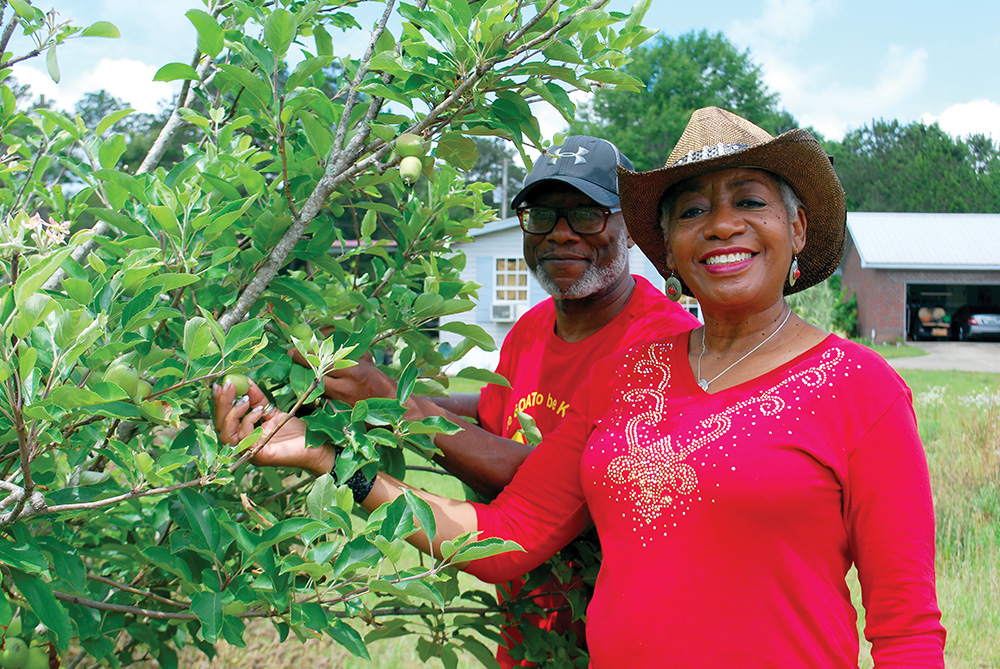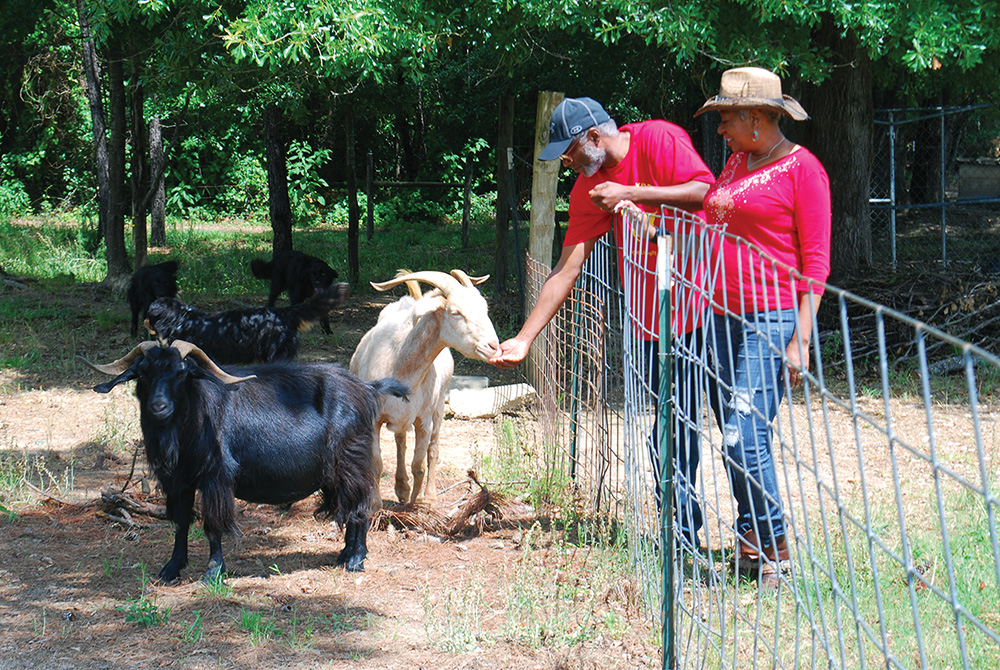
Story and photos by Katie Jackson
It takes a lot of faith to believe that a tiny seed can become a mighty harvest. It takes even more faith to plant seeds for the future of farming. But faith, along with energy and knowledge, are things that Barbour County farmers Jewell and Russell Bean have in abundance.
The Beans, who operate Stanford and Bean Farm in Eufaula, began their farming journey in 2008 when the two left their urban careers in Georgia to return to their parents’ 106-year-old 88-acre farm, where Jewell’s father and grandfather had farmed the land.
The Beans always planned to one day come back home to Alabama (Russell is from Dothan; Jewell grew up in Eufaula), but “one day” arrived earlier than they expected after Jewell’s father became ill.
Russell and Jewell moved home from the Lake Oconee/Lake Sinclair area to help care for her father. They also began figuring out ways to revitalize the family farm.
Though they had plenty of land and both had done a little farm work in their younger days, Jewell and Russell didn’t feel they had the know-how to make the land truly productive. They did, however, feel a spiritual beckoning to become stewards of that land and make Jewell the third generation of Stanfords to work the farm.
They decided to volunteer in the area to gain experience, including with Barbara and Roy Shipman, who run The Cottage House farm and community center in Ariton. The Beans also began attending farm meetings and workshops and were soon invited to join a two-year agricultural leadership class coordinated by Southern University and A&M College in Louisiana.
Through that leadership program, the Beans traveled across the nation to learn about farming and farm resources. In that process they discovered the rich cache of assistance available through such U.S. Department of Agriculture agencies as the Cooperative Extension System, Natural Resources Conservation Service and Farm Services Agency.
“These resources are the best-kept secret in agriculture,” Russell says. “They offer a lot of knowledge-based information, plus assistance through cost-share programs and grants for small farmers.”
Through cost-share programs and the help of USDA and experts at land-grant universities, the Beans obtained a well, fencing, drip irrigation, tunnel houses and the like, as well as advice, such as guidance on erosion control and pasture development.
As they built their farming operation, they also built relationships — which led them to yet another “calling.”
Sharing the knowledge

“Farming isn’t easy,” Russell says. “A farm can be a never-ending job and money pit, so you have to watch what you are doing. You have to learn to be flexible and multitask. There are some things that are out of your control, so you have to learn to handle the things you can control and be prepared for emergencies when possible.
“When you think about these things, it makes you wonder why in the world anyone would ever want to farm,” Russell says. “But in this career, you really see the fruits of your labor. And you can make money, while building something to pass on to your children.”
“It’s like preaching,” Jewell says. “You better be sure that God has called you to do this.”
The Beans did feel called to it and, while they made their share of mistakes, they never lost faith. They learned from those mistakes and forged on to create an award-winning, sustainable, organic farming operation.
Among their numerous honors, the Beans received the U.S. Natural Resources Conservation Service’s national Lloyd Wright Small Farm of the Year award in 2016.
They are also “called” to share their hard-earned knowledge with other farmers, which they do by serving as resource specialists with Tuskegee University. In that role, they work with other emerging farmers of all ages and backgrounds to provide peer-to-peer trainings developed with their mentor professor, Victor Khan, at Tuskegee University.
“We want to empower, inform and educate,” Jewell says. “That’s what we did for ourselves first, and now we do it for others because we want others to get the right knowledge to make the right decisions.”
“Our personal motto is ‘dream big, think big, but start small,’” Russell says. That’s the message they impart when they are traveling the state and country to teach, or when hosting the hundreds of people who come to their farm from across the state, region and country for farm training.

Expanding the calling
The Beans work as farmers and as educators, and they embrace everyone who visits their farm. They not only feed their guests with knowledge and food, they also send them away with produce. In fact, the Beans don’t market their farm goods, but instead share the fruits of their labor with visitors and with churches and food banks in the area. Anything that doesn’t walk away from the farm is fed to their animals.
“Nothing goes to waste here,” Jewell says.
The Beans are in the process of expanding this “calling” by renovating facilities to house farmers, students and professors who, they hope, will work together on the farm for more extended periods of time. They are also working with Auburn University medicinal plant guru Tia Gonzales to install a medicinal plant demonstration and production garden, which has become another passion for the Beans.
They always welcome volunteers and donations for the farm and are currently looking for a manager who can live and work on the farm, allowing the Beans more time to travel and spread their faith and knowledge.
“Our family motto is ‘Never give up. Always give back,’” Jewell says. “My parents brought us up that way. That’s why this farm is so blessed. It’s blessed by the blood, sweat and tears that my family invested in it, but also by the seeds of faith they planted here and in us.
“It’s a God thing,” she says.
To learn more about the Beans or to volunteer or make contributions, email [email protected] or [email protected] or call 334-687-2532.




